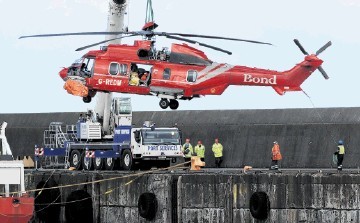
A helicopter which ditched in the North Sea was placed under “close monitoring” on the eve of the flight after amber warning lights flashed.
The alert for high vibration levels in the engine was signalled during the two trips before the Super Puma had to make an emergency landing off Aberdeen on May 10.
Investigators who checked other similar Eurocopter aircraft after the potentially catastrophic incident also found that several had the wrong size of screw hole in their gearbox.
And evidence has emerged that the emergency lubrication system in their engines is not as reliable as was assumed.
The findings are contained in the latest Air Accidents Investigation Branch (AAIB) report into the controlled ditching of the Bond-operated aircraft, in which two crew and 12 passengers were rescued.
The AAIB said that there were three cracks found in the affected gearbox shaft.
An amber light also flashed to indicate high vibration levels after a flight on the day before the incident, leading to a washer being replaced.
The light flashed again after a flight the next morning, along with another for “meshing” in the oil pump wheels.
Thirty-six other indicators were checked with “no significant trends detected”, and the aircraft was placed on “close monitoring” for 10 hours and released for the flight.
The Press and Journal previously revealed that the same Super Puma G-REDW suffered an engine failure on its way back from an oilfield less than a month before the incident.
After it ditched, the manufacturer cut the vibration level required to generate the amber light and introduced new red light thresholds for both the indicators.
Meanwhile, the inquiry into the emergency lubrication system has been “broadened” amid evidence that the reliability of some components is lower than required for the relevant safety certificates.
Gear shafts in 18 similar helicopters were also checked after the incident and investigators found “some variability” in the screw holes, with “a number outside the design tolerance”.
A spokesman for Bond said: “Bond Offshore Helicopters can confirm that it has no aircraft in service that have any of the affected shafts fitted.
“We welcome the update from the AAIB and note that it is consistent with the earlier statement from Eurocopter on the incident.”
A spokeswoman for Eurocopter declined to comment last night.
A north-east MSP last night branded the latest report on the Super Puma ditching as “extremely worrying”.
The Air Accident Investigation Branch found a series of problems with the helicopters as part of its ongoing probe into the incident off the coast of Aberdeen in May.
Kevin Stewart, SNP MSP for Aberdeen Central, said: “This is extremely worrying to hear and, representing a great many people who work in the oil industry, this will fill them with some concern. I hope that action is taken to ensure that the entire helicopter fleet that serves the North Sea basin is up to the highest possible standard.”